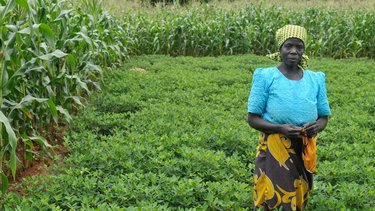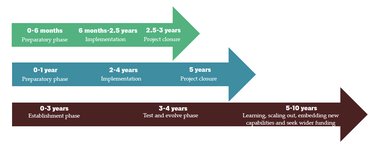

LIFE-AR has a unique principle-based and partnership-based approach, closely linked to the LDC Vision.
LIFE-AR is LDC-led and LDC-owned, and focuses on strengthening LDCs’ institutions, systems and capabilities. The initiative is anchored within government’s existing institutions, and priorities link to existing climate governance arrangements. LIFE-AR is also long term and works at the pace of LDCs, recognising that different countries have different capacities.
The LDC 2050 Vision is for LDCs to deliver climate-resilient development pathways by 2030 and net zero emissions by 2050 to ensure societies, economies and ecosystems thrive.
LIFE-AR focuses on strengthening LDCs’ institutions, systems and capabilities.
We will work with the whole of society to achieve a low-carbon, climate-resilient future
Work together to reduce transaction costs and ensure mutual accountability behind LDC leadership
Work together jointly on a shared and equal platform
We will develop strong climate finance architecture, with at least 70% of flows supporting local-level action by 2030
Provide high-quality, predictable and accessible finance and support the LDCs’ intention of at least 70% of finance flows supporting local-level action by 2030
Commit to a shared goal of 70% of finance flows supporting action on the ground in LDCs by 2030
We will integrate adaptation, mitigation and resilience into our national and local development objectives
Develop your own ambitious strategies for 1.5°C low-carbon climate-resilient pathways by 2020
Invest in integrated, holistic and ambitious climate planning across the whole of society
We will strengthen our climate capabilities, institutions, knowledge, skills and learning
Work with us in the long term to strengthen our national and local institutional capabilities
Work at the pace of individual LDCs, aiming to build long-term national and local institutions, systems, structures and capabilities
We will create more inclusive governance of climate decisions that are centred on gender transformation and social justice
Invest in our inclusive climate-resilient net-zero economies and technology
Leave no country and no one behind
The term ‘Business Unusual’ emerged during the development of the LDC Vision and the design of LIFE-AR. Business Unusual describes what needs to change for the LDCs to access climate finance and invest it in affected communities.
Business Unusual is linked with the LDCs’ Asks of the international community.
The diagram below explains the main differences and innovations of the business unusual approach.
Gender equality and social inclusion is embedded into the LIFE-AR principles, Vision and Compact, which recognize the importance of gender equity and community-led whole society approaches to tackling the most challenging issues related to climate change for more effective and lasting solutions.
This is emphasized in the LIFE-AR governance structures which aim to create more inclusive governance for climate decisions that are centered on gender transformation and social justice and the LIFE-AR Compact principle to leave no country and no one behind. At the platform level, the LIFE-AR Board is designed to ensure equal representation from both development partners and Least Developed Countries (LDCs). The ten front-runner countries represent diverse geographies, including both Anglophone and Francophone nations.
At national level, each country has established inclusive platforms of governance with representation across whole of society. These platforms ensure linkages across different sectors, state and non-state actors including civil society, government, academia and the private sector for greater coordination and prioritization of investments.
LIFE-AR recognizes that it is only when the impacts of climate change on the most marginalized members of society are included and integrated into climate resilience and adaptation planning and investments that the most appropriate and long-term solutions can be found. Each LIFE-AR country is taking a context specific approach to ensure that gender considerations are integrated in the most appropriate ways in the design and implementation of their governance and delivery mechanisms. This approach will ensure inclusive decision-making and drive equitable adaptation outcomes for all including women, young people, people with disabilities, and other marginalised groups.
By applying these principles and approaches, LIFE-AR is:
